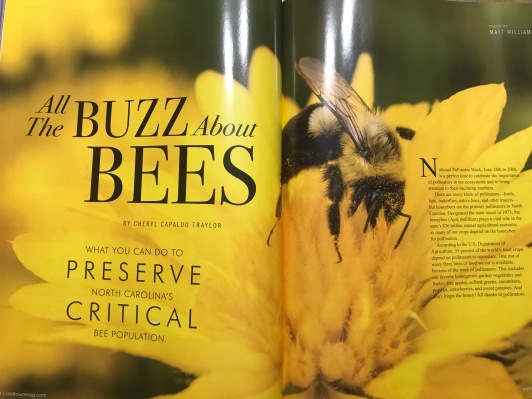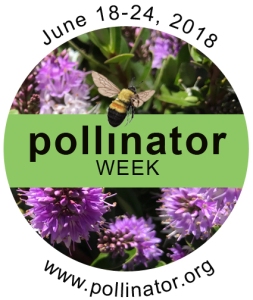It’s a busy time of year for everyone: spring gardening, spring cleaning, graduations, end-of-year award ceremonies, holiday travel, and a whole lot of other happenings.
 My photo of article in Midtown magazine. Photo of bee on flower by Matt Williams.
My photo of article in Midtown magazine. Photo of bee on flower by Matt Williams.
I’ve been busy working on several upcoming article assignments, and that’s the reason for my lack of writing a recent blog post. So, I thought I’d share an article I wrote for the current issue of Midtown magazine. It’s on a subject that’s near and dear to my heart, pollinators, specifically honeybees (Apis mellifera). Their numbers have been declining due to several reasons, most notably Varroa mite infestation. There is encouraging news, though. Some local beekeepers are starting to see an increase in their colonies. What can home gardeners do to help? Read more about it in my most recent article appearing in the May/June issue of Midtown magazine on Raleigh newsstands now.
Mark your calendars for National Pollinator Week 2018, June 18-24, and let’s all do our part to help the pollinators! See you after my deadline is over:)

What an important subject: bees! Congrats, Cheryl. I have a Jekyll & Hyde response to bees. I know how important they are and appreciate what they do so much, but I am afraid because all the ones out here have been Africanized and are quite dangerous when they start to mass together (even inside my living room).
LikeLiked by 1 person
I understand that. From what I’ve read, they are supposed to be much faster and more aggressive than the regular honeybee. My Dad was allergic to all bees. I once saw him after a sting and thought he would die. It was very scary.
LikeLiked by 1 person
Yes, very aggressive. They kill people and animals.
LikeLike
Congratulations on the article Cheryl, it’s an important subject.
LikeLike
Yes it is, and I hope more people begin to take notice. Thanks, Andrea.
LikeLiked by 1 person
Reblogged this on and commented:
I hadn’t realized pollinator week is upon us but am acutely (and sadly) aware that most of the honey — even “organic,” is being reported to be contaminated with the glyphosate of Monsanto’s Roundup: https://www.huffingtonpost.com/carey-gillam/fda-finds-monsantos-weed_b_12008680.html
It’s pleasing to see more people interested in honeybee production but we apparently need to do more to help these bees stay busy and thrive.
LikeLiked by 1 person
Happy to say I’ve planted my gardens with lots of bee and butterfly loving plants…and allow the goldenrod to linger (even with seasonal allergies).
Very informative article! Loved it so much I’m happy to reblog it.
LikeLiked by 1 person
Yes, I’ve done the same. I’ve especially been more conscious about including a wide variety of native plants in my existing beds. Change starts at home with each of us. Thanks so much, writegardener:)
LikeLiked by 1 person
It’s wonderful to see you are doing what you love – an article written by a person with passion for the subject usually makes compelling reading. Unfortunately I can’t read the article as that publication isn’t available here. I’ve noticed in recent years here on my tiny patch of ground and in the areas I habitually walk, a growing number of bees of all types busy at their work. It could be due to the fact that my awful neighbour – a man of dubious morals and a pesticide addiction – moved away two and a half years ago to be replaced by an older retired couple who understand how to tend their natural environment. And it could equally be due to the fact that more and more people are becoming aware of the reality of chemicals and their catastrophic impact on our planet.
LikeLiked by 1 person
Thanks, Pauline. Did the link in my post not take you to the online article? It should have, if it’s working properly. Let me know.
I, too, am starting to see more honeybees and other buzzing bees around. Ten years ago we noticed a sharp decline. There was a summer when we saw very few bees of any kind on a 70 acre garden estate! It’s very concerning! I hope bee populations increase, and pesticide use decreases. I think as more people are made aware, our pollinators will thrive again. I’m an optimist; I can’t help but believe most folks don’t mean to do harm. Emphasis on ‘most’.
LikeLiked by 1 person
Ah! Well, there you are! I didn’t realise that was a link (simply because it wasn’t in a different colour – so much for my agile brain!!) Excellent article 🙂 I knew it would be. And I agree, most people do better when they know better and getting the word out gives them the opportunity to learn, to grow, to change.
LikeLiked by 1 person
Thank you for reading it, Pauline! I’m constantly learning new things about this blogging world and highlighting those links is one of them:) Actually, my whole blog could use an overhaul. Maybe after this next deadline passes…
LikeLiked by 1 person
You are brave! The thought of ‘over-hauling’ terrifies me!
LikeLiked by 1 person
I enjoyed the article – this is a subject close to my heart.
There’s been a lot of work in my suburb regarding pollinators. The city just made a resolution to use bee-friendly practices in its parks and open spaces. The big thing now is to avoid using insecticides that contain neonicatinoids, which have been linked to declining bee populations.
I’ve been pretty happy this year to see the number of bees and wasps (that eat a lot of the pests) in our yard. Over the last ten years, we replaced large lawn areas with perennial plants and don’t use chemicals. As I try to explain to people – it’s not just about preserving and caring for the natural world – pollinators impact our food supplies. Sometimes people get so disconnected from the natural world that you have to make the case for what will directly affect them.
LikeLiked by 1 person
Thanks for reading the article, Michelle. Yes, I think there’s so much that can be done to make a difference. It’s wonderful to hear of whole towns and cities that take this serious. Of course, it would be great if neonics were banned completely, and I think eventually they will be. There’s more work to be done, no doubt, but it makes me happy that so many are understanding what’s at stake here—our survival! Food is important! Sounds like you are definitely doing your part:) I’m doing the same in my yard/garden.
LikeLiked by 1 person
I read your Midtown article and thought it was very good. I used to work at a beekeeping supply house and learned a lot about bees. The more people know, the more I hope to see more efforts. I’m delighted when I see yet another beekeeper born.
LikeLiked by 1 person
Thanks, Lisa! You have such interesting stories and life experiences. You’re right about knowledge. I believe when more people know what’s at stake here, the more we can make positive changes in our environment.
LikeLiked by 1 person
I enjoyed reading your most recent article. It’s inspiring to me that you seem to do what you’re passionate about.
LikeLiked by 1 person
Thank you. Most of the time, yes I do get to write about my passions. Nature:) I pitch a ton of ideas to my editor, mostly about being outside and nature, so the chances are pretty good that I get to write at least one of my articles on that. I also want to start writing more about people and our connections with each other. What brings us together? How can we celebrate our differences (not merely accept or tolerate them) and work together to create a kinder world for all beings. I know that’s a lofty wish, but I’m gonna try! Thanks for reading, friend.
LikeLiked by 1 person